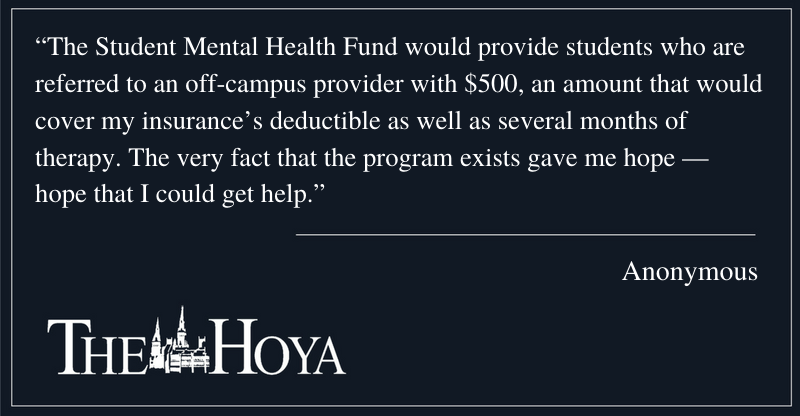This article discusses suicide and self-harm. Please refer to the end of the article for resources on and off campus.
Having suffered from anxiety and depression throughout high school, I immediately sought Counseling and Psychiatric Services for therapy when I arrived at Georgetown University. However, I had no idea that CAPS does not provide long-term treatment to students. During my first session at CAPS, they had me fill out a survey about my mental health history. Because I had a history of self-harm and suicidal ideation, the people at CAPS informed me that I would eventually be referred to an off-campus therapist but that I could use CAPS services in the meantime. They did not tell me how long “the meantime” meant. By the end of my freshman year, I was left stranded without therapy.
During my sophomore fall, I did not try to seek off-campus therapy because I knew I could not possibly afford it. Therapists in the Washington, D.C. area charge an absurd amount, averaging $210 per session. With my insurance, I have to reach a $280 deductible before the company will start paying 80% of the fee for each session with an in-network therapist. I would still have to pay $40 per session. This fact means that if the therapist I had my initial session with did not seem to be a good match for me, the fee of that session would be a waste, as it would not count toward my deductible. If the therapist is out of network, then I would have to pay everything out of pocket. It was too much work. I did not want to add to my laundry list of things I constantly worry about.
During this period, I was horribly depressed and experienced frequent anxiety attacks. The only way I could cope was through sleep. Even getting out of bed was challenging. On the occasions I miraculously dragged myself out of bed for class, I ended up falling asleep during most of them anyway, which was frustrating for both me and my professors. I had always been a straight-A student, including during my freshman year at Georgetown, but my grades dropped significantly sophomore fall. I ended up dropping a class. It was bad.
Eventually, I was so depressed that I was scared I was going to harm myself. I ended up walking myself to the Medstar Georgetown University Hospital, thinking it would be safer for me to be hospitalized. Having previously been hospitalized for suicidal ideation, I thought checking into a psychiatric hospital would be the best way to prevent me from killing myself.
But I also felt that even a hospitalization could not help me at this point. I knew what to expect. I would be kept there for a week, and, afterward, I would be strapped with a medical bill I had no way of paying. I would have much more school work to catch up on and might risk being put on medical leave. I could not afford to take any of these risks. That was when I realized I really needed off-campus therapy.
I learned about the Student Mental Health Fund, originally known as the Off-Campus Therapy Stipend, through a newsletter from the Georgetown University Student Association. The fund would provide students who are referred to an off-campus provider with $500, an amount that would cover my insurance’s deductible as well as several months of therapy. The very fact that the program exists gave me hope — hope that I could get help. I attended the information session about how to apply for the program. I had to complete some paperwork to confirm I had been referred out of CAPS, and discussedI discuss my financial constraints. After my application was reviewed, I received the stipend at the end of November 2018. I felt a wave of relief wash over me: I could finally seek the therapy that I so urgently needed.
The money from the fund motivated me to find the help I needed and made the transition to off-campus services smoother. Through the stipend, I was finally able to find a therapist best-suited to meet my needs by the end of my sophomore fall. My therapist specializes in the issues I struggle with: acculturation and adjustment, anxiety, self-esteem and peer relationships. All of these issues require continuous, long-term sessions to work on; the short-term counseling sessions at CAPS would not be able to address them as thoroughly. By working with my therapist in cognitive behavioral therapy, I have developed positive coping skills that help me get through my panic attacks and depressive episodes.
As of now, I am still working with my off-campus therapist. I am extremely grateful that the Student Mental Health Fund gave me the help I needed to remain in school and graduate.
I am sharing my experience because I want this program to remain institutionally implemented. The fund has saved my life, and I hope it can continue to help other Georgetown students in the future.
The author is a student at Georgetown University.
Resources: On-campus resources include Health Education Services (202-687-8949); additional off-campus resources include the National Suicide Prevention Lifeline (800-273-8255)














